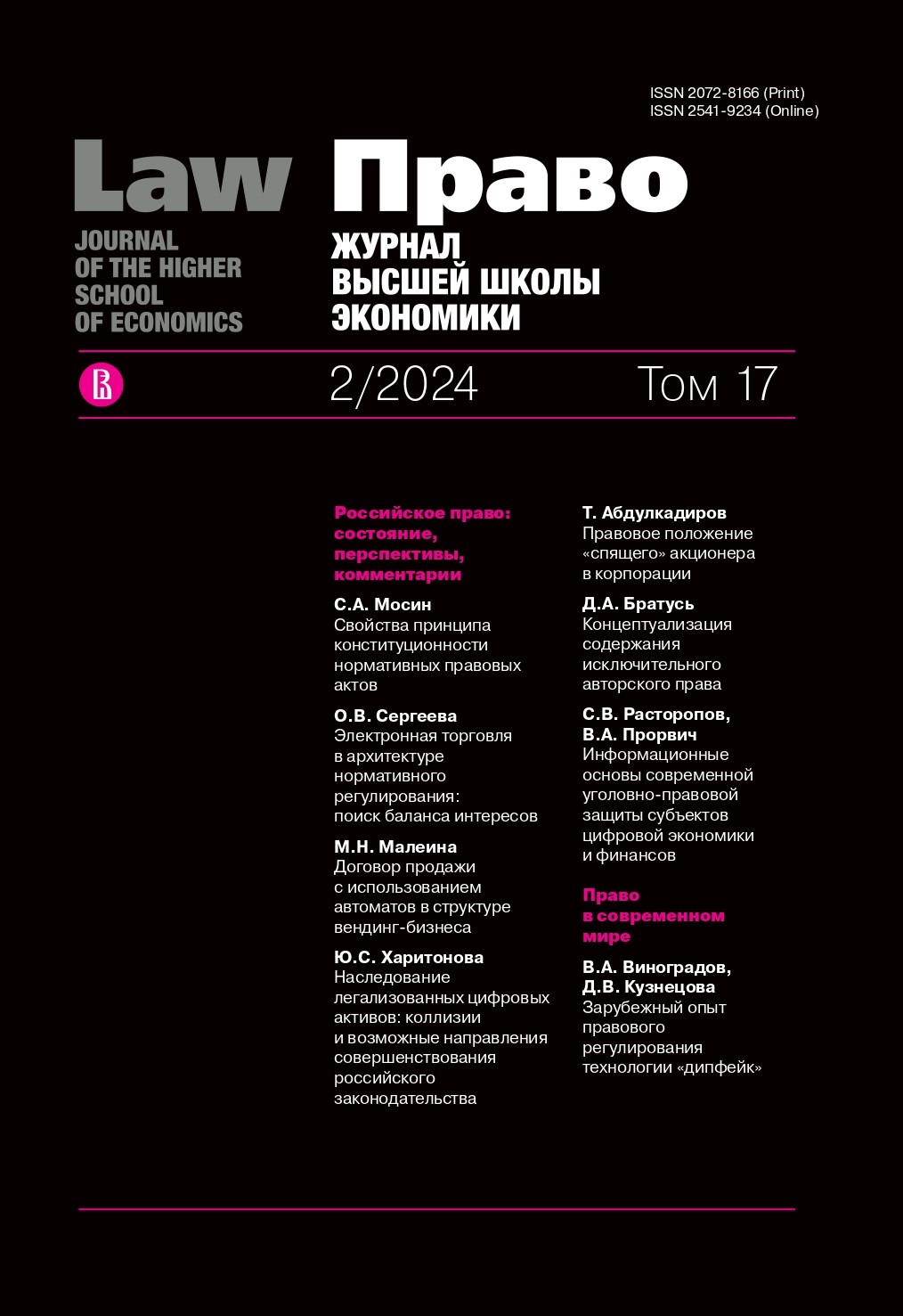Properties of the Principle of Constitutionality of Normative Acts
Abstract
The article studies the principle of constitutionality of normative legal acts in terms of its properties: axiomaticity, presumptiveness and dogmatic fictitiousness. Such methods of research, as comparative, systemic-structural and formal logical, in their combination allowed to consider and characterize these properties and thus to study this principle in the most comprehensive manner. Assuming the constitutional principles guide the development of the whole legal system, while ensuring its stability and ability to adapt it in a timely manner to changing circumstances, as appropriate, such principles among other properties have the properties of axiomaticity, presumptiveness and dogmatic fictitiousness. In this connection the purpose of the present study is to confirm the hypothesis that the principle of constitutionality of normative legal acts, characterized as a requirement of strict conformity of the Constitution of the Russian Federation with the provisions of normative acts, has a set of these properties. Thus in the course of the study it was established that while the principle in question is axiomatic, it formulates the basic rule — “the law must be constitutional”, which has the character of a normative legal act must be lawful”. In turn, obliging the enforcer to proceed from the assumption of conformity of normative legal acts with the provisions of the Constitution, this principle has the property of presumptiveness, and the legal presumption of the constitutionality of normative legal acts is an essential tool for monitoring compliance with the supremacy of the Constitution. At the same time, a high degree of normative generality gives the considered principle of constitutionality of normative legal acts the property of dogmatic fictitiousness. This property determines the potential of the given constitutional principle and allows to reveal its legal content. It has been substantiated that, within the limits of its constitutionality, the normative legal acts adopted must meet, inter alia, the requirements of the principle of maintaining citizens’ trust in the law and actions of the state, the requirements of certainty, clarity, unambiguity and consistency with legal regulation. In addition, there should be no corruption factors in legal acts.
References
Bogdanovskaya I.Yu. (2022) E-Government: Legal Aspects. Legal Issues in the Digital Age, vol. 3, no. 4, pp. 4-13. DOI: https://doi.org/10.17323/2713-2749.2022.4.4.13
Dmitriev Yu., Petrov S., Amirbekov K. (2001) The concept and principles of constitutional legality. Pravo i zhizn’=Law and Life, no. 38, pp. 5-26 (in Russ.)
Fuller L.L. (1964) The morality of law. New Haven: Yale University Press, pp. 95-105.
Kokotov A.N. (2020) Trust. Distrust. Law. Moscow: Norma, 192 p. (in Russ.)
Kravets I.A. (2006) Constitutionality of normative legal acts: doctrine and practice in Russia. Pravo i politika=Law and Politics, no. 8, pp. 23-37 (in Russ.)
Lebedev V.A. (2005) Constitutional ensuring and protecting human and civil rights and freedoms in Russia (theory and practice of modernity). Moscow: University Press, 272 p. (in Russ.)
Lukyanov V.Yu. (2006) Legal presumptions in legislation on technical regulation. Zakonodatelstvo i ekonom/ka=Legislation and Economics, no. 10, pp. 10-13 (in Russ.)
Postnikov A.E. (2012) On the constitutional method of regulation. Zhurnal rossiyskogo prava=Journal of Russian Law, no. 12, pp. 27-34 (in Russ.)
Pryakhina T.M. (2004) Constitutionality in the system of principles of law. Sovremennoye pravo=Modern Law, no. 10, pp. 45-50 (in Russ.)
Remnev V.l. (1979) Socialist legality in public administration. Moscow: Nauka, 301 p. (in Russ.)
Samoshchenko I.S. (1960) Rule of law in the Soviet state. Moscow: Gosjurizdat, 200 p. (in Russ.)
Senyakin I.N. (2010) Principles of law and legislation: correlation and interrelation. In: Principles of Russian law. N.I. Matuzov (ed.). Saratov: State Academy of Law, pp. 128-144 (in Russ.)
Sivitsky V.A. (2010) The presumption of constitutionality of a normative legal act. Juridicheskaya tekhnika=Legal Technique, no. 4, pp. 499-502 (in Russ.)
Tikhomirov Yu.A. (2000) Conflict of laws: a manual. Moscow, p. 393 (in Russ.)
Tikhomirov Yu.A. (1997) Criteria of legality of legal acts. Pravo i ekonomika=Law and Economy, no. 19-20, pp. 3-6 (in Russ.)
Tolstik V.A. (2010) Presumption of legality of normative legal acts. Juridicheskaya tekhnika=Legal Technique, no. 4, pp. 546-551 (in Russ.)
Vinogradov V.A., Larichev A.A. (2022) Index of ethics of law as a tool for assessing relationship between law and morality. Law. Journal of the Higher School of Economics, vol. 15, no. 5, pp. 4-23 (in Russ.) DOI: https://doi.org/10.17323/2072-8166.2022.5.4.23
Vlasenko N.A. (2001) Legislative technology. Theory. Experience. Rules. Irkutsk: East Siberia Publishers, 142 p. (in Russ.)
Zelepukin A.A. (2010) Principles of Russian legislation. In: Principles of Russian Law. Saratov: State Academy of Law, pp. 145-175 (in Russ.)





